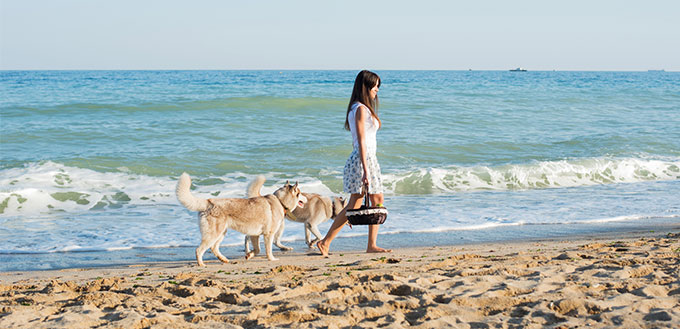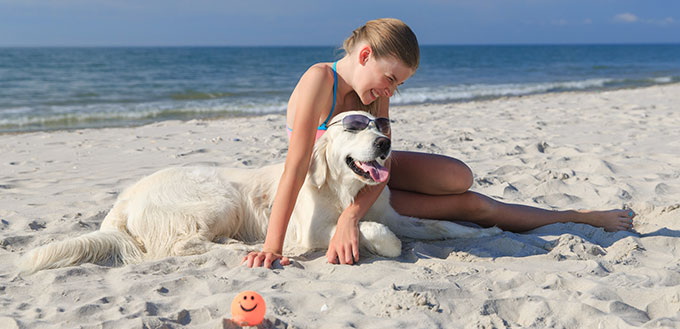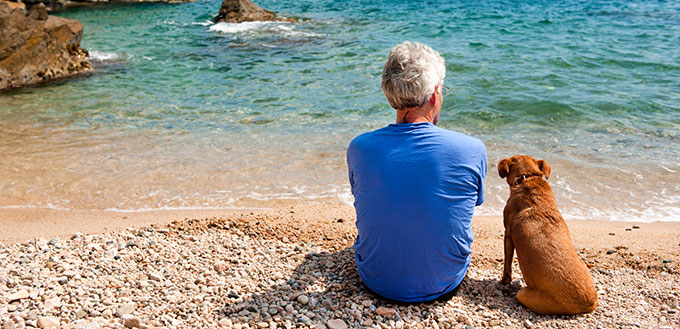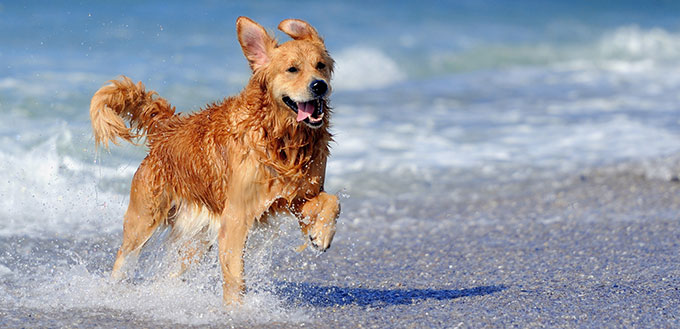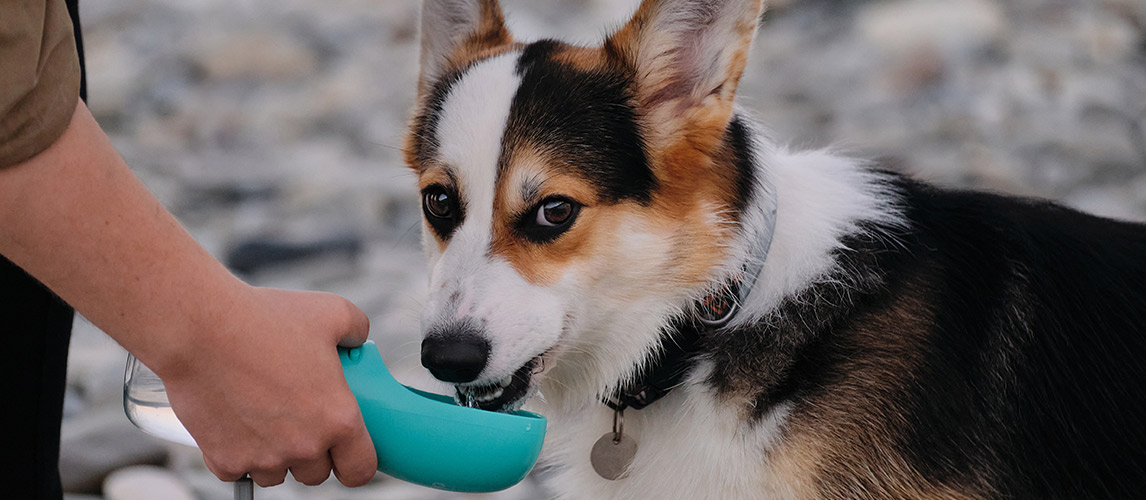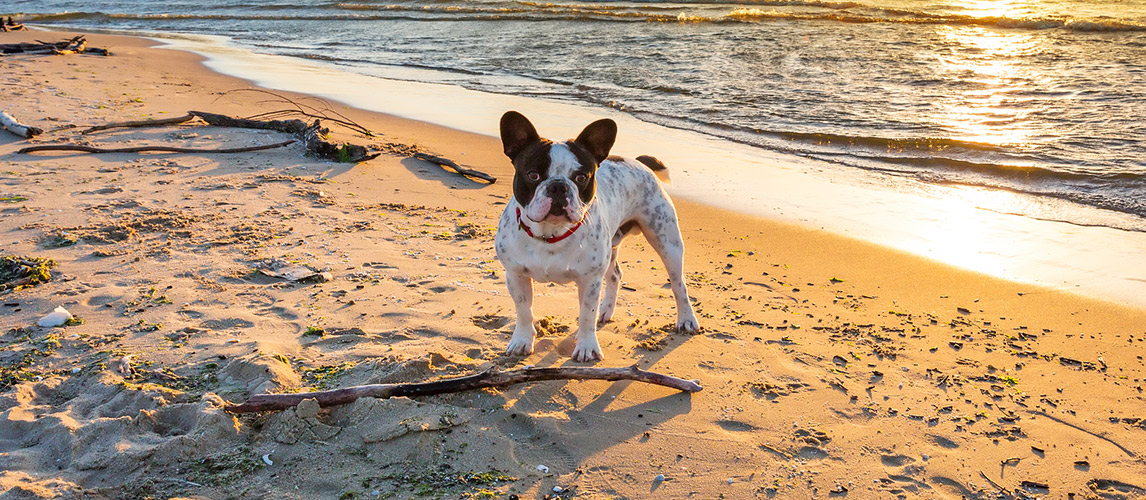[vc_row][/vc_row]
Hanging out with your pooch at the beach is one of the best things about being a dog Mom or Dad. Dogs love everything about being at the beach. They love the water, they love the sand and they really love the ball games! Ideally, you should have a list of dog-friendly beaches that allow dogs to join in the fun with their human family.
The safety of your dog must also be one of your top priorities. Taking dogs to the beach is a big responsibility and you must be fully aware of the hazards and how to reduce the risk of canine injury and illness. Here, we’ve summarized our top five tips on how to keep your dog safe at the beach.
Don’t Let Your Dog Gulp Saltwater
Spending hours at the beach is thirsty work for dogs and they may tempted to quench that thirst by gulping down salt water. This is something that you should not let them do. Salt water causes dehydration in dogs and could lead to a health emergency. You will be able to tell that your dog has dehydration because they will probably vomit, they will have thick saliva and their gums will feel sticky and dry. If this happens, you must get your pooch to a vet right away. Dehydration can be life-threatening, especially in young pups and senior dogs.
It doesn’t matter if your dog swallows a small quantity of salt water – after all, we’ve all done that from time to time whilst swimming in the sea! However, you must do what you can to stop them having a long drink of it. The best way to do this is to make sure that they have access to plenty of cool, fresh water. Store the fresh water it in an insulated container to keep it nice and cold all day and take a dog water bottle or a dog travel bowl that folds away with you.
Watch Out for High Temperatures
Dogs at the beach can get extremely hot because there is often no shade on the sand. If you don’t take precautions, they can end up suffering from heat exhaustion or heat stroke and both are potentially fatal conditions for dogs.
New dog owners often ask, “Can dogs go to the beach during a heat wave?” and the answer is yes but only during the coolest parts of the day which would be early morning and late evening. Even at these times, you should take some portable shade with you. You may want to invest in a portable dog tent or dog kennel that is quick to put up and take down. You may also want to get a cooling vest or pad that they can lie on if they get too hot and take some toys that they can chew so that they do not get bored.
Check out our article on Dog Chews.
Make sure that you are familiar with the signs of heat stroke in dogs so that you will know when you need to get them to a vet. A dog with heat stroke will seem very lethargic, will be panting excessively and will have red gums. They may also have a sudden onset of vomiting and/or diarrhea. Sadly, dogs cannot recognize that they are at risk of heat stroke and will carry on running around!
Don’t forget that the sand can get very hot so please also take care of your dog’s paws as they can burn. Some booties may be a good idea.
Take a look at this guide on Paw Protection Waxes For Dogs.
Exercise Caution in the Water
Trips to the beach for dogs means a dip in the sea! It is the part that they enjoy most but a sea swim can present dangers. Before you let your pooch head into the surf, you should take a few precautions.
Choose a spot where the tides and currents are not too strong and where the waves are small. Even if your dog is a strong swimmer, you may want to invest in a dog life jacket device that has a chin support. Give your pooch a good rinse when they get out of the sea as salty water is an irritant and dry them off with towels. Make sure that your pup does not head into the sea unsupervised by keeping them on a leash.
Use Dog Sun Screen
Dogs can get sun burnt at the beach in the same way as humans. They can also get skin cancers caused by excessive exposure to UV in sunlight. This does not mean that you can use human sun screen because it can contain zinc which is harmful for dogs. Instead, look out for a sun screen for dogs that has all the features that you need such as ease of application and sun protection factor. You may also want a product the moisturizes the skin and that is waterproof.
The most sensitive areas on a dog’s body are those that are not covered by a lot of fur. Therefore, you should always apply sun screen to the ears, nose and belly area. Dogs with light colored coats and coats that are short or thin are most at risk of getting sun burn. Sun burn on a dog looks like a red and inflamed patch. They can also get eye irritation from the sand and sun. If their eyes become red and are sticky after a beach day, you should consider taking your dog to be checked out by your vet.
See our round-up of the Best Sunscreen for Dogs.
Guard Against Illnesses, Parasites and Infections
It is your job to protect your pooch from illnesses and parasites that they can pick up at the beach. It is a natural environment and there will inevitably be micro-organisms that can cause them harm. Pools in rocks can harbor bacteria that cause diseases such as Leptospirosis. This is a serious infection that can cause kidney failure in dogs and they catch it from paddling in and licking the water in pools of stagnant water. If you intend to spend a lot of time on the beach with your dog, discuss the possibility of getting your pooch vaccinated against this disease.
Many beaches favored by dog owners are surrounded by woodland and vegetation and dogs can pick up ticks and fleas from this sort of environment. Regular flea treatment is advisable for all dogs.
Take a dog first aid kit with you that includes a liquid bandage, a tick removal tool, antiseptic wipes for dogs and heartworm medicine.
The Last Word
By following these simple safety tips, you can take your dog to the beach safely and have plenty of fun together. Don’t forget to bring the dog poop bags to keep the beach clean and tidy for everyone!
Sources:
- Heat Safety Tips, The MSPCA–Angell
- Hot Weather Safety Tips, The ASPCA


